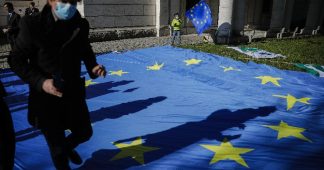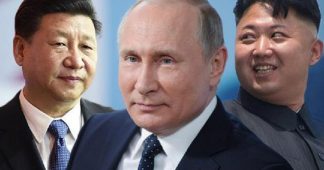If we look at what is happening in US-Russian and US-Chinese relations, in the wider Middle East, the former Soviet republics or Latin America, or the world economy and social uprisings from the USA to the Lebanon and from Bolivia to France, the current international situation bears several similarities to what happened in the years 1914, 1929 and 1939, that is, to the years when the two world wars broke out and the great economic crisis of 1929 erupted.
In fact, only the existence of nuclear weapons has prevented, up to now, the outbreak of a world war in the form of WWI and II. But we are, without the shadow of a doubt, already living in the environment of a “low-intensity”, “slow motion” world war and also in the environment of two or three new Cold Wars (against Russia, China and Islam, in particular Iran). Since 2008 we have also been living in the environment of an economic crisis which is different in form, but still as deep as the 1873 and 1929 crises were, and now accelerated by the Coronavirus.
All the factors which led in the past to world wars, revolutions and totalitarian movements, like Nazism and huge reform projects, like the New Deal or the post-war European welfare state, are here. But they are operating in a fundamentally altered world. The Coronavirus crisis is maybe only the first of a series of more and more important disasters affecting all humanity, predicted by various scientists long ago, as a result of both the technologies developed and of the radical change in Man’s relation with nature.
We are leaving the world we know, without having solved most of its problems and contradictions, only to enter the historical era when the very existence of life on earth will be decided, probably in a matter of decades (the next decade will be more decisive, and what will follow will be the most dramatic). This reality is so enormous and so fearful that it is provoking denial or escape from both logic and freedom, among both a large part of public opinion and among the decision-makers themselves. (In the past, Erich Fromm gave us a superb description of those factors leading to the rise of Nazism in Germany, with his book “Escape from Freedom”; now we can see the same psychological mechanisms in action in Trump’s USA or in Bolsonaro’s Brazil).
It is exercising huge pressures on Logos (Logic, Reason, Science), on the capacity of human beings to love, on the fundamental human drive for freedom and even for collective survival, that is, on the main intellectual, emotional and moral capacities humanity disposes of to defend itself from the appearing threats and the ultimate danger. I don’t believe in humanity, recently said Ellon Musk, one of the most powerful people on Earth, in an argument with Gates.
Unfortunately, we are still unable to fully grasp the situation, because we are afraid of the consequences we will need to draw from it. Subconsciously and emotionally, at least, we prefer to live in the much better situation which prevailed, in many parts of the world, after WWII.
This war situation is taking the traditional form of nation-to-nation conflicts, but it is also encompassing parts of society and, more and more, the fundamentals of human civilisation and nature itself in a direct way, never seen in human history.
Divisions inside the ruling Empire of Finance
It is the depth of this crisis affecting the still dominating system of world Capitalism which explains the depth and the intensity of the divisions now affecting western capitalism and the very centre of imperial power: Trump vs. Biden, Huntington’s followers vs. Fukuyama, neoliberal “globalizers” vs. Neocons, Netanyahu vs. Soros. Those differences have no bearing on the strategic goal (preserving the power of Western financial capitalism in order to preserve the power of holders of capital on societies and the planet as the whole, as this is what exactly means the word Capitalism). On this everybody agrees. The differences, as happened already during the ‘30s, have to do more with the methods, the strategies and the ideologies used to attain this goal.
The one camp is represented by the classical neoliberal elites. After the Soviets collapsed, a collapse they thought it represented the “End of History”, they believed western capitalism will be able to assimilate all the planet by its economic and ideological power. They are hostile, albeit in an eclectic way, to all strong identities and structures, like nations, states, traditional ideologies and religions, even gender. They want to repress them or, better, hijack them and use them for their own purposes.
The other camp is represented by the Neocons, Huntington and Yinon’s followers, the hairs of the extremist tendency discernible in the US and British establishment since WWII. For them, coercion and even permanent war should be the main method to impose the new world order. As it is difficult to launch simultaneously war against everybody and there are now nuclear arms, they profess the “Clash of Civilizations” scenario, that is to use all possible antagonisms between nations and group of nations, and all other identities like religions, in order to impose their rule by “divide and rule” methods. That was always a method for Empires, but here it takes a new quality and dimension. They do not want to abolish nationalisms and other strong identities. They want to use them one against the other.
This, combined with Trump’s vague “anti-systemic” and even “anti-war” (!) rhetoric has created enormous confusion to forces around the globe, including forces which wanted to defend their nations against imperialist aspirations and they thought Trump wants to do the same.
To use another analogy, the Empire and its “counter-revolution”, has produced its “Bolsheviks” (Trump, Thiel, Pompeo, Bannon, Netanyahu etc.) and its “Mensheviks” (Obama, Merkel, Soros etc.). In a different way of course, the same split appeared in the ‘30s between “democratic imperialists” (Roosevelt, Churchill) and “totalitarian” ones (Hitler, Mussolini).
The project of a war against Iran, central to the Neocon imperialist project, is one of the best examples, because here the differences of the two camps are reflected in the clearest possible way. We have no sympathy for George Soros or Zbigniew Brzezinski and in particular their fanatic anti-Russian stand. But more important than condemning one or another politician is to understand in depth what is at stake in every situation. Soros and Brzezinski were (and Soros remains) staunch opponents of Iraq and projected Iran wars, while Netanyahu is one of their main architects. Obama signed a peace agreement with Iran; Trump abolished it.
The campaign against Soros during the last years is not due to his liberal ideas, his financial speculation or his hostility towards Russia. It is due to his opposition to the Iran war and has exploited in depth the general and justified suspicion towards this person and his activities and his anti-Russian stand.
The “Bolsheviks” of the Empire are not, and cannot by definition be, more friendly than Soros towards Russia, as long as Russia remains a huge entity not absolutely controlled by them, thus impeding their control over the whole planet. But they possess a far larger capacity to hide their real intentions than Soros. This is not a coincidence. It reflects the more complete character of their rupture with the rationalism characterising traditional capitalism as we knew it. They don’t need to give birth to a new, even reactionary model. Their chosen strategy is the destruction of all previous orders, this is why chaos and confusion can become their tool.
The Rise of the Neocon faction
As early as 1993, Huntington opposed the “War of Civilizations” to Fukuyama’s “End of History.” You can easily discern there a system for the domination of Finance over all other human groups, which are put in a clear hierarchy and they preserve the imperial power by fighting one against the other.
In the early 1990s, the Jeremiah and Wolfowitz reports described a “proactive” strategy for the United States to maintain world hegemony, a goal that is also the stated goal of the Plan for an American Century. In the 90s, a group led by Richard Pearl and funded by Netanyahu drafted the plans for the Iraqi and the other Middle East wars.
This tendency, because it is a minority and because its program is provoking sharp reactions, is using systematically methods of “coups”, deception and “entryism” to achieve its goals. They manage to falsify elections in Florida and take power (Bush, Cheney, Rumsfeld). Then they unfolded their agenda, using 9/11 (which they probably did not prevent while they could) to launch the “war on terror,” that is, on Islam and to invade Iraq. This invasion is a sub-chapter of Huntington’s Civilization War, an exercise of imperial power, directed also at Russia, China and Europe and the realization of a strategy by Israeli extremists to overthrow and destroy any regime/country in the Arab-Muslim world that could threaten Israeli omnipotence in the Middle East. As we are transiting from neoliberal to the capitalism of catastrophe (Greece), so here we are transiting from the imperialism of conquest to that of catastrophe (Iraq). Both tendencies constitute a very strong indication of the inherent difficulty of the global system to deal with its crisis, without causing ever greater disasters.
Iraq was the first dish, but the neo-conservative plan was to overthrow in 2-3 years all the regimes in the Middle East up to Iran, and even in North Korea. Just as the intervention and dismembering of Yugoslavia was the ‘general test’ for the wars in the Middle East to come, so the later are the ‘general test’ for what will follow in various other regions around the globe, as for example the former USSR.
The invasion of Iraq by the Americans (and their British, Australian and Polish allies) was not the walk the “conservatives” promised, either because they really believed it or because they wanted to facilitate entry into the Middle East and beyond. . The country was occupied, but the occupying forces met fierce resistance, while the invasion remained completely delegitimized in world public opinion.
As a result of this situation, the neocon project for the conquest/distraction of all the Middle East came to a standill. The Empire has faced the dilemma of proceeding on a much broader scale, in order to achieve the implementation of the neoconservative program to go into a fold, expecting better days.
The escalation would be a war against Iran using tactical nuclear weapons. It was proposed, but it met with strong opposition from the American deep state, the military and the secret services, and it could not be carried out.
The Obama alternative and its final failure
Obama’s election represents the forces opposing the Neocon war project inside the US and Western establishment. But the new President does not or cannot come to a full conflict with the Neocons (and the Lobby). Hillary, his Secretary of State, is completely allied on their positions, while the assistant secretary of state Victoria Nuland is herself a representative of the Neocons. We see here the reflection of the continuous increase of the influence of extremists in all the US state and administration apparatus, even independently of the Presidents. With Obama in Washington and Sarkozy in Paris, the Neocons make Paris and London the main centers of their plans. They will use France and Britain to begin the attack on Libya, while Hillary will be able to overcome the initial objections of Obama, who will express publicly his regret for the Libya campaign, before leaving the White House. In Egypt, the Neocons will also be able to impose their line, by helping Sissi overthrow Morsi. They are, most probably, responsible for the coup against Erdogan in 2016.
But, despite everything, Obama manages to cancel the two main neocon attacks during his staying in power. He will avoid repeating the Iraq campaign in Syria, in 2013, as he was pressed to do by the Neocons. And, instead of launching the war against Iran, which was the main neocon project, he will sign what amounts, in reality, to a peace agreement with this country.
There is a more general conclusion to be drawn by what Obama did not manage to do. Despite the President’s “brilliance,” global capitalism in the age of globalization does not seem to have the ability – or the will – to make the concessions needed to support the alternative to the neo-conservative coercive program. The moderate “political Islam” that Obama has sought to support, as an alternative to the “war of civilizations” in the Middle East, has no way of being funded in the context of neoliberal “globalization.” Only Turkey has achieved something, but its relative success remains fragile and if it succeeded, it did so by skillfully playing various anti-Western cards. The difficulty for Westerners is structural. If the invasions do not solve the problem of Western domination, so do the elections, the successes of Hamas and Morsi proving that.
Obama was not only unable to provide a foreign alternative to Neocons, he was also unable to complete the most indispensable social reform in his own country, the generalization of the health care and also to curtail the power of Finance, directly responsible for the 2008 crisis.
Neocons laid the ground for Obama’s victory. Obama and the Neoliberals laid the ground for Trump’s victory, which is not representing the simple revival of the Neocon project but a much more comprehensible strategy.
Trump and the crisis of “Globalization”
As far as “Globalization” is concerned, there is no more confusing term. We believe we should understand it as the attempt to impose capitalist relations of production and distribution and the corresponding culture to the whole planet, after the collapse of the so-called “socialist bloc”.
This is a central, strategic goal of the western capitalist system corresponding to fundamental, organic factors related to its very functioning and even survival and this is why it is uniting in reality all factions inside Western capitalism, in spite of differences over the methods to achieve it.
But since 2008, the dominant system is facing some very threatening challenges to its domination
- It is less and less accepted by citizens of the main developed western countries. There is an enormous demand for radical and credible solutions.
- Externally, the globalization project has failed to provoke a Chinese perestroika, that is to overthrow the political (monopoly of the CP) and the economic (planned economy) regime of China. As Samir Amin stated two years ago, speaking to Chinese professors and students, this country can hardly be called socialist, but it remains non – capitalist. It has, up to now, refused to succumb to the dictatorship of the world Financial Capital (the “financial globalization”). China is one of the very few countries in the world which was able, in spite of huge concessions to foreign capital, to dominate on its relation with it, to use it and not to be used by it, in final analysis
- Russia (a military superpower) did not remain the vassal state it became under Yeltsin and the Russian Federation was not dislocated, as Brzezinski and others were hoping
- The Neocon project for the Middle East failed to produce the desired results and put the Empire in front of a serious dilemma: compromise with Iran (Obama, US deep state) or war even with use of tactical nuclear weapons and various risks associated (Trump, Neocons).
Trump and his allies came to give their own answer to those challenges and impasses:
- To channel the confused feeling of revolt and hate of the establishment to directions which ultimately will help US capitalism survive and dominate, much as Hitler did in the past. He wants to use democracy in order to destroy it (Thiel, of the Bildemberg group, has been quite clear on that. As for Bannon, he is not a kind of revolutionary born out of social struggles, he was working in Goldman Sachs).
- To create the political – ideological conditions appropriate for Cold (or even Hot) wars against China, Russia and Islam, in particular Iran and even Nature itself.
- To submit European allies to his power
- To rewrite the rules of “globalization” in a way more favorable to US interests. In extremis he could try to decouple China from globalization, the way the “socialist bloc” was decoupled from world economy during the Cold War, but we are not sure if this is possible or if it will be helpful for western capitalism
- To try to destroy the relationship between Russia and China, by pretending to be a friend of Russia
- To reinvigorate the neocon war by launching, if possible, a war against Iran and help realize the project of Great Israel (Jerusalem, Golan, etc.)
Many people will find such a project very dangerous. Still what increases its chances is the fact that both the traditional neoliberal elites and what deserves to be called Left (or the powers affected by Imperialism) are unable to provide with a coherent and credible alternative of their own. And, as Polonius told Hamlet “Though this be madness, yet there is method in’t.”
The Empire counterattacks
Faced with such challenges, a section of the system itself again resorts to the services of its extremist tendency, which returns to power with Trump, under the influence of people such as Thiel (of the Bildemberg), Bannon, Pompeo etc. By analogy, the German Capital was forced in the past, to tolerate and resort to the services of the “intruders “, of “parvenus” to the system, like the National Socialists of Adolf Hitler
Despite significant differences with Nazism, Trump’s experience performs the same historical function. He uses the discomfort of the masses from the system to put them finally at his service. Germans wanted a Revolution in the ‘30s, but they were afraid of doing it themselves, so they entrusted Hitler to do it in their place, writes Wilhelm Reich.
The outspoken and outrageous behavior of the President contributes significantly to the destruction of the very meaning of meaning, of all social, international and moral conventions, to the attempt to destroy Logos itself, a key tool of Man in the struggle for his Freedom, and to introduce the strategies based on Chaos and Confusion. Trump has made a huge contribution to the destruction of any rational and moral rules of American society and the “international community,” a destruction that is necessary if one is to transform humanity into herds of wild animals capable of turning anywhere with the skillful use of inferior functions of consciousness, instincts and the unconscious, but also the never imagined in the past new possibilities of manipulation through the Internet.
Of course, we must trace Trump’s real aspirations, or rather those that directing him and pushing him, in practice, not in his rhetoric. The first thing the supposedly anti-systemic president did when he took over the presidency was to give to Goldman Sachs’ people the most direct exercise of American economic governance. Then he tested the nuclear threat against Russia, with the two bombings of Syria, despite the presence of Russian troops there. He has also tested China’s reactions by threatening North Korea with complete extinction. He familiarized world public opinion with the unthinkable possibility of nuclear war. He destroyed the nuclear weapons control structure and undermined any binding international rules and any international framework for cooperation. He surrendered completely and in a way that no US President has done much of the US foreign policy to the Israeli PM. He has withdrawn from the Iran deal and is actively preparing for war with that country, which would have already broken out, and almost broke out, if it was not stopped by the reaction of the American deep state, a reaction that also stopped his intention to use the army to suppress protests in American cities.
He is supposedly a friend of Russia and many consider he came with, in his mind or the mind of forces manipulating him, to break Russia’s partnership with China, which poses insurmountable obstacles to the global domination of Western Capital. However, his administration escalated the military encirclement of Russia. He worked even with Israel to reach a Serbia-Kosovo agreement that excludes Russia and China from the Balkans and he tried to use Turkey against Russia in Libya and Syria. Under his presidency, the United States has increased 25 times the military assistance to Azerbaijan, fighting now against Armenians, undermining Russia’s role in the ex-USSR. All that proves he is not a friend of Russia, but of course it does not prove that his ultimate goal is not to destroy the Russian-Chinese partnership. We can now state with quite a degree of high probability that, behind the Reagan’s intensification of the Cold War, was hidden probably the aim of providing Soviet reformers with the arguments they needed to begin the dismantling of the USSR and, in particular, the Soviet Armed Forces.
In various circles around, Trump remains still popular because he is perceived as an opponent of globalization. We explained before why this is a chimera. Trump is not against it and could not be as the core of globalization is nothing else than the generalization of capitalist relations of production and distribution on the planet. Nor is it possible to fight against globalization, aiming at a “good”, “national capitalism” which is, in our time, a greater utopia than “socialism in a single country” and “National Socialism” represented in their time.
What Trump wants and does is to introduce an element of violence and coercion in “globalization”, not to abolish it, but to replace it with a much worse system, in which it will work, but only to the extent that it works in favor of the US interests. He wants to solve the problems of the viability of capitalism with more violence against China, against the masses, against Iran, against the environment and against human civilization. This is the real project of Trump and his political allies internationally (Johnson, Bolsonaro, Monti, etc.). If they prevail, they will significantly increase the chance of a global catastrophe
The chances of them prevailing increase as they face bankrupt neoliberal elites, such as those now rallying behind Biden, elites who have almost nothing to offer their country and the world and who have done everything to stop the democratic and socialist challenge of Sanders, more interested in defeating than him, than in preventing Trump to get power.
It is true that these neoliberal elites are more conservative and less dangerous than the extremist current around Trump, which could wreak havoc and possibly irreversible damage to humanity if it continues to dominate US power. His climatic policy alone is able to destroy or harm seriously the very conditions for human survival.
But we should keep in mind that it is the policy of the neoliberal elites themselves, that breeds and fuels the far-right, near-fascist extremism of Trump and his allies internationally.
The need of an alternative
Only the timely formation of national and international political subjects, bearers of a new model, in the South, East and West, who will be able to unite the struggle for the social, democratic, ecological needs of humanity, starting from the partial resistances that are developing to unite them into a kind of a new “International” around a new vision of humanity for the 21th Century could, in prospect, win over the enormous, existential threats hanging upon humanity.
We need a new vision which, taking into account all passed experiences, from Ancient Athens to Socialism and May 1968, both their achievements and their failures, will become a positive proposal for a new chapter in Human History.
Many you will probably say that such goals are utopian and absolutely unrealistic. Maybe. But it seems to us it is much more “utopian” and unrealistic to expect human species to survive this century with its present social, international and cultural fabric.
(*) You may read an extended version of this article at www.konstantakopoulos.gr










